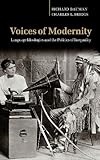Voices of modernity : language ideologies and the politics of inequality / Richard Bauman, Charles L. Briggs.
Material type: TextLanguage: English Series: Studies in the social and cultural foundations of language ; 21Publication details: Cambridge, England ; New York : Cambridge University Press, 2003. Description: xv, 356 p. ; 24 cmISBN: 0521810698; 0521008972 (pbk.); 9780521810692Subject(s): Language and culture. -- HistoryDDC classification: 401.43 LOC classification: P35 | .B33 2003Online resources: WorldCat details | E-book Fulltext
TextLanguage: English Series: Studies in the social and cultural foundations of language ; 21Publication details: Cambridge, England ; New York : Cambridge University Press, 2003. Description: xv, 356 p. ; 24 cmISBN: 0521810698; 0521008972 (pbk.); 9780521810692Subject(s): Language and culture. -- HistoryDDC classification: 401.43 LOC classification: P35 | .B33 2003Online resources: WorldCat details | E-book Fulltext | Item type | Current library | Collection | Call number | Copy number | Status | Date due | Barcode | Item holds |
|---|---|---|---|---|---|---|---|---|
 E-Book
E-Book
|
Dr. S. R. Lasker Library, EWU E-book | Non-fiction | 401.43 BAV 2003 (Browse shelf(Opens below)) | Not for loan | ||||
 Text
Text
|
Dr. S. R. Lasker Library, EWU Reserve Section | Non-fiction | 401.43 BAV 2003 (Browse shelf(Opens below)) | C-1 | Not For Loan | 19162 | ||
 Text
Text
|
Dr. S. R. Lasker Library, EWU Reserve Section | Non-fiction | 401.43 BAV 2003 (Browse shelf(Opens below)) | C-2 | Not For Loan | 22090 |
Includes bibliographical references and index.
TOC Introduction --
Making language safe for science and society: from Francis Bacon to John Lock --
Antiquaries and philologists: the construction of modernity and its others in seventeenth- and eighteenth-century England --
The critical foundations of national epic: Hugh Blair, the Ossian controversy, and the rhetoric of authenticity --
Johann Gottfried Herder: language reform, das Volk, and the patriarchal state in eighteenth-century Germany --
The Brothers Grimm: scientizing, textual production in the service of romantic nationalism --
Henry Rowe school craft and the making of an American textual tradition --
The foundation of all future researches: Franz Boas, George Hunt, Native American texts and the construction of modernity --
Conclusion.
Summary:
Language and tradition have long been relegated to the sidelines as scholars have considered the role of politics, science, technology and economics in the making of the modern world. This novel reading of over two centuries of philosophy, political theory, anthropology, folklore and history argues that new ways of imagining language and representing supposedly premodern people - the poor, labourers, country folk, non-europeans and women - made political and scientific revolutions possible. The connections between language ideologies, privileged linguistic codes, and political concepts and practices shape the diverse ways we perceive ourselves and others. Bauman and Briggs demonstrate that contemporary efforts to make schemes of social inequality based on race, gender, class and nationality seem compelling and legitimate, rely on deeply-rooted ideas about language and tradition. Showing how critics of modernity unwittingly reproduce these foundational fictions, they suggest new strategies for challenging the undemocratic influence of these voices of modernity.
English
Tahur Ahmed

There are no comments on this title.